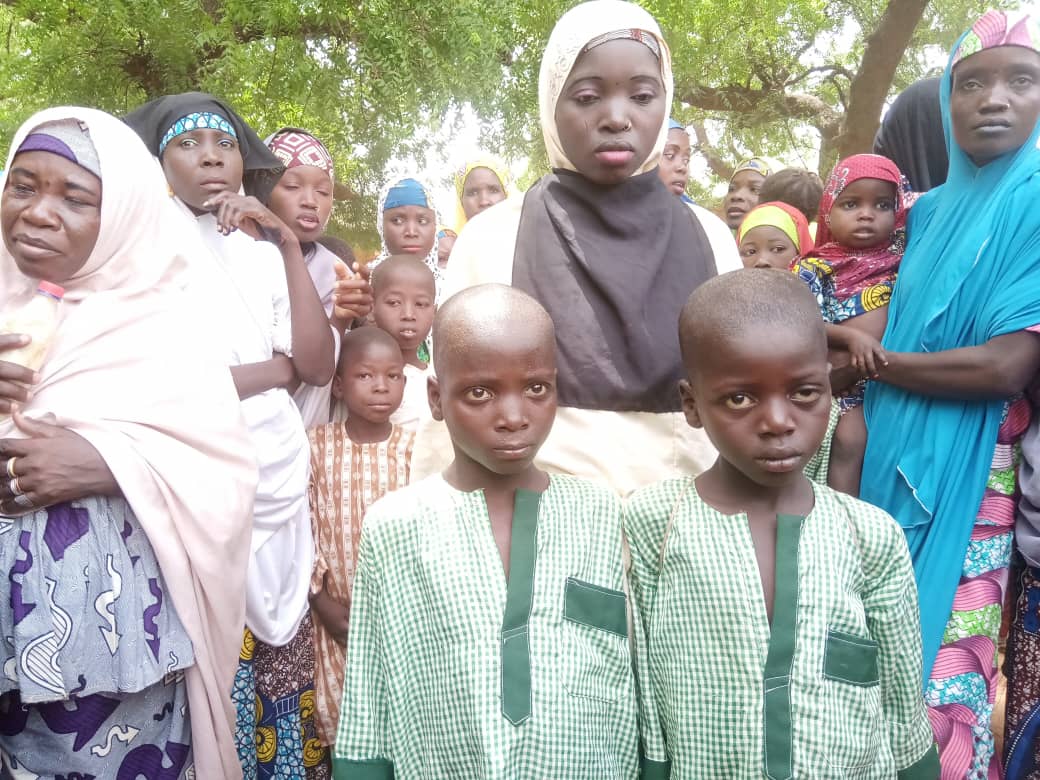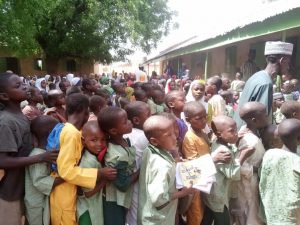News
UNICEF Cash Transfer Programme, looking beyond 2020

UNICEF Cash Transfer Programme, looking beyond 2020
By Funmi Lawrence
The United Nations Children Education Fund (UNICEF) has introduced Cash Transfer Programme (CTP) ,is focusing on addressing education challenge in Nigeria and to contribute to a greater reduction of the number of out-of-school children in the country.

Cash transfers, small predictable sums of money given to ultra poor families with children, are a relatively new Social Protection strategy by the UNICEF to the Eastern and Southern Africa in order to alleviate household poverty, showing positive results throughout the region.
The programme is through the expansion of the Girls Education Project Phase 3 (GEP3), funded by the UK Department of International Development, in partnership with Educate a Child (EAC) and it will help over a million of the world’s poorest girls improve their lives through education.
The interventions are in line with the UNICEF’s vision and mission of the realisation of children’s rights including their right to education and with EAC’s mission, vision and goals, focusing on out-of-school children and quality education for them.
The overall goal of EAC is to expand access to quality basic education for 501,749 out-of-school children by 2020 in Katsina, Kebbi, Sokoto and Zamfara.
Each beneficiaries of the UNICEF CTP were paid N8,000 per term which was intended to offset the cost of sending the children to school.
It is no doubt that there are resistance to sending children, especially girls, to school in the northern part of Nigeria, out of the 10.2 million out-of-school children in the country according to the recent number declared by the Minister of Education, Malam Adamu Adamu, stated that about 60 per cent of them are girls.
This problem is more prevalent in the north. A mistrust of the intent and value of western education is partly responsible for this. The other reason is the high level of poverty prevalent in these communities.
The CTP programme, however, was introduced as “a funding window” to reduce the number of out-of-school children in Katsina, Kebbi, Sokoto and Zamfara states by 2020.
However, stakeholders were of the view that taking over the project by various states where the projects are domicile after 2020 would help cement the vision the project aims at achieving.
The Kebbi Government says it will continue with the Cash Transfer Programme (CTP) for Out-of-School Children in the state after the UNICEF intervention ends in 2020.
.
Beneficiaries of the Cash Transfer Programme of UNICEF at the Grand Model Primary School Kawara, Maiyawa Local Government Area of Kebbi State.
Alhaji Mohammad Magawata, the state’s Commissioner for Basic and Secondary Education, said at the end of a Two-Day CTP Media Dialogue and workshop organised for journalist in Birnin Kebbi.
Magawata said the project aimed at helping to reduce the number of Out-of-School Children, particularly in the northern part of the country as well as increase enrolment, retention and completion in school.
He said that when the UNICEF completed its project in 2020, the state would continue from there.
“Kebbi state is planning to continue by taking over the CTP project after the UNICEF intervention in 2020.
“Our hands are on the deck to ensure that we continue with the programme because we realised that the project is laudable and interesting.
“The programme has increased the attendance and retention of the number of the pupils in our schools in a very big way.
“Before the programme, only few schools have full attendance but now that the programme has been introduced in various Local Government Areas (LGAs) of the state, things have changed.
“If you compare the LGAs that have enjoyed the programme, you will see a very huge difference from the areas where the programme had not reached,’’ he said.
Magawata said the state had spent N280 million on feeding, adding that government has built 40 nomadic schools to enhance the programme.
The commissioner said the state has embarked on the recruitment of additional 2,000 teachers in order to tackle the challenge of increase in the number of enrolment.
“We have identified 504 Almajiri Islamic schools and planned to make necessary renovations for them and ensure that we send mathematics and English teachers to the schools at all cost.
“This is part of our aim to measure up with the 2020 deadline by the UNICEF in order to eradicate the volume of Out-of-School Children in our state.
“This programme would help to reduce and deplete the number of Out-of-School Children in the state and we will be least in the northern region.
“I have been to all the LGAs headquarters and we have finished with the recruitment of the teachers, we would soon start issuing the offer of appointment letters to the over 2,000 new teachers.’’
Magawata said that education in the state had improved from what it used to be and gave the credit to the state governor Alhaji Abubakar Bagudu for his efforts at ensuring that education sector was revamp.
He said the governor gave priority to the education sector.
According to him, the governor met a very sorrowful basic education condition, where over 70 per cent were operating below standards.
“Meanwhile, right now, he has been able to do a lot to see that the schools in the state are adequately furnished with qualified teachers to teach,’’ he said.
Also, Mr Isa Umar, Kebbi State Coordinator of the CTP noted that Kebbi and Zamfara States are considered as ‘educationally disadvantaged’ States in Nigeria.
Speaking at the media dialogue, Umar said over 41,000 pupils in the state are currently being paid N8,000 every academic term to encourage learning.
Nasifi Hashimu and Hamiru Hashimu have benefited from the UNICEF Cash Transfer Programme and are enrolled in Grand Model Primary Schools, Kawara, Kebbi State.
According to him, CTP was introduced as a social security net to assist the poorest of the poor in accessing education.
He said despite the fact that primary education was officially free and compulsory and the states were guided by the policy and UBE Act (2004), there are high numbers of out-of-school children, of which majority are girls.
“Education indicators for the states are not encouraging, partly driven by social attitudes towards ‘western’ education, and poverty of parents, especially at rural communities.
“The poverty level of rural community members largely restricts their level of participation in the education of their children.
“Majority of them cannot afford purchases of basic learning materials, not to even support school infrastructural development.’’
He, therefore, said that on their part, the state was already working to ensure that it continued from where UNICEF would stop by putting in place various programmes to assist the education of the people.
Meanwhile, an Educationist and Development Consultant for UNICEF, Dr Dayo Ogundimu identified poverty, early child marriage and others as some factors affecting girl-child education in Nigeria and other African countries.
Ogundimu, who is also the Principal Consultant, ComForch Development Communications, said these factors posed a serious challenge to girl-child education in the country.
“In Nigeria and other developing countries, poverty is a critical barrier to the girl-child education.
“ CTP therefore contributes to poverty reduction in the family and the community.
“ The CTP being implemented by UNICEF in some states in the north would help protect educational investment in the girl-child and help alleviate future poverty.
“Cash Transfers are cash grants made to school age children (especially the girl-child) to enable them enrol stay in school and complete their education.
“Also, cash grants help the beneficiaries to pay for things that are essential for their schooling – books, writing materials, fees, etc.
“On a global scale, cash transfers contribute to poverty reduction in the family and the community.
“The Conditional Cash Transfer (CCT) provides financial support to families for specific purpose, e.g. to ensure proper school participation by school-age children (especially the girl-child).”
The State Project Coordinator, EAC in Kebbi state, Mr Isah Usman, said that the CTP would address some of the underlying causes of inequalities in education outcomes, such as poverty, social exclusion and malnutrition.
Usman said the CTP had changed the situation and contributed to a greater reduction of the number of children out-of-school.
The UNICEF, had on May 20, 2018 reported that in Zamfara State, that one Hadiza received N24,000 (about $66) to help her send three of her children to school.
At 40, she had not seen that amount of money before in her entire life. Someone had to help her count it.
Hadiza was paid N8,000 per child for three of her sons to enroll in school. It was part of the first installment of cash transfers to mothers in Zamfara State, northcentral, intended to offset the cost of sending children to school.
The CTP is a project initiated by the UNICEF in 2018 that is expected to be completed by 2020.
News
Amb Lion Ogorry Files Landmark Lawsuit Against Sahara Reporters, Sowore For Misleading and Malicious Publication Endangering National Security

Ambassador Adebayo Lion Ogorry, a renowned public advocacy practitioner and activist, today announced the filing of a high-profile lawsuit against Sahara Reporters Ltd. and its publisher, Omoyele Sowore, in the High Court of the Federal Capital Territory, Abuja.
The suit, numbered FCT/HC/CV/4767/2025, accuses the defendants of publishing a false, malicious, and reckless article that violates Nigeria’s Constitution, the Cybercrimes (Prohibition, Prevention, Etc.) Act 2015, and other laws protecting public discourse, national security, and public order.
The originating summons, filed on November 24, 2025, stems from a Sahara Reporters article titled
“EXCLUSIVE: How Tinubu’s Defence Minister Matawalle Maintains Contact With Bandit Leaders, Ordered Them To Compel Communities To Vote For APC—Former Aide,” published on November 19, 2025.
Ambassador Ogorry alleges that the publication contains grave, unfounded accusations against the Honourable Minister of State for Defence, Dr. Bello Matawalle, claiming he maintains illicit contacts with bandit leaders, orders communities to vote for the All Progressives Congress (APC), and engages in activities that undermine counter-terrorism efforts.
These claims, according to the suit, are not only false but also fabricated to incite alarm, hatred, and ill-will, while endangering national security and public safety.
In his affidavit supporting the summons, Ambassador Ogorry, a Nigerian citizen and resident of Abuja with a long-standing commitment to public order and lawful civic discourse, emphasized that the article was disseminated widely across Sahara Reporters’ website, social media channels, X.com (Twitter) account, Facebook pages, WhatsApp broadcasts, and other platforms. He described the publication as a blatant violation of Section 39(3)(a) of the 1999 Constitution (as amended), which prohibits speech that endangers public safety, national security, and public order. Furthermore, it contravenes Sections 24(1)(a) & (b) of the Cybercrimes Act 2015 by disseminating false, misleading, and harmful information capable of causing alarm or ill-will.
“The defendants’ reckless actions have not only tarnished the reputation of a dedicated public servant but have also compromised ongoing military operations against banditry and terrorism in Nigeria’s North-West region,” said Ambassador Ogorry. “This publication promotes distrust, exposes the Minister to risks, and undermines the morale of our armed forces engaged in counter-terrorism. It is a direct assault on our national security and the freedom of expression that must be balanced with responsibility.”
The lawsuit seeks the following reliefs from the court:
– A declaration that the publication is false, misleading, malicious, and not protected speech under Section 39(1) of the Constitution (as amended).
– A declaration that it falls within restricted speech under Section 39(3)(a), endangering public safety, national security, and public order.
– A declaration that it violates Sections 24(1)(a) & (b) of the Cybercrimes Act 2015 by prohibiting false, harmful, or misleading information.
– AN ORDER OF INJUNCTION restraining the Defendants, their agents, or privies from further publishing, distributing, circulating, or causing to be circulated the said false publication or any other malicious publication especially as it relates to and against the person of Defence Minister, Dr. Matawalle.
– An order directing the defendants to issue a public retraction of the publication and publish a full apology on their website and social media channels for 14 consecutive days.
– General and exemplary damages of N10,000,000,000 (Ten Billion Naira) for the frivolous, false, and malicious publication geared toward endangering public safety, national security, and public order.
Ambassador Ogorry highlighted that the article, based on unverified claims from an alleged “former senior aide,” lacks any official record or evidence, demonstrating the defendants’ disregard for truth and ethical journalism. He urged the court to address this as a matter of urgent national importance, citing precedents such as President F.R.N. v. ISA (2017) and Guardian Newspapers v. AIEH (2011), which affirm that freedom of expression does not protect reckless publications that threaten security.
“This lawsuit is not just about correcting a falsehood; it’s about safeguarding Nigeria’s democracy, protecting public officials from baseless attacks, and ensuring media accountability,” Ambassador Ogorry added. “Sahara Reporters and Omoyele Sowore must be held responsible for their role in spreading dangerous misinformation that could fuel terrorism and disrupt public order.”
The case is set for hearing in the Abuja Judicial Division, and Ambassador Ogorry expressed confidence in the judiciary’s ability to uphold justice and constitutional principles.
About Ambassador Adebayo Lion Ogorry
Ambassador Adebayo Lion Ogorry is a public advocacy practitioner, activist, and Nigerian citizen dedicated to promoting national security, public order, and lawful civic discourse. With a focus on protecting public discourse from malicious interference, he advocates for responsible journalism and governance.
-

 Featured6 years ago
Featured6 years agoLampard Names New Chelsea Manager
-

 Featured6 years ago
Featured6 years agoFG To Extends Lockdown In FCT, Lagos Ogun states For 7days
-

 Featured6 years ago
Featured6 years agoChildren Custody: Court Adjourns Mike Ezuruonye, Wife’s Case To April 7
-

 Featured6 years ago
Featured6 years agoNYSC Dismisses Report Of DG’s Plan To Islamize Benue Orientation Camp
-

 Featured4 years ago
Featured4 years agoTransfer Saga: How Mikel Obi Refused to compensate me After I Linked Him Worth $4m Deal In Kuwait SC – Okafor
-
Sports3 years ago
TINUBU LAMBAST DELE MOMODU
-

 News11 months ago
News11 months agoZulu to Super Eagles B team, President Tinubu is happy with you
-
Featured6 years ago
Board urges FG to establish one-stop rehabilitation centres in 6 geopolitical zones

1 Comment